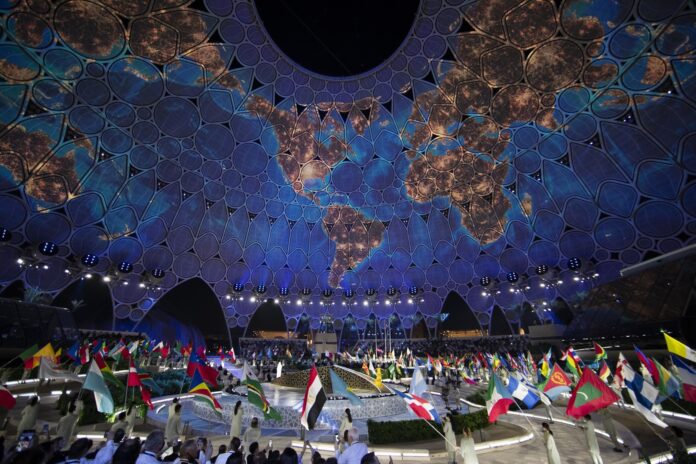The event, titled “Moving from climate crisis response to risk management – space technologies for anticipatory humanitarian action,” was convened by the Embassy of Sweden in the UAE, the European Union, the World Food Programme (WFP), the United Nations Office for the Coordination of Humanitarian Affairs (OCHA) and the International Committee of the Red Cross (ICRC).
High-level speakers included His Excellency Per Olsson Fridh, Minister of International Development Cooperation of Sweden, Her Excellency Reem al Hashimy, UAE Minister of State for International Cooperation, Managing Director of the Dubai Expo 2020 Higher Committee and Director General of the Dubai Expo 2020 Bureau,David Beasley, WFP Executive Director, and Robert Mardini, ICRC Director General.
The meeting came amid mounting evidence that climate-driven crises are occurring at greater frequency and with greater intensity than ever before. Today, weather-related disasters occur nearly five times as often as 40 years ago. The number of people around the world requiring lifesaving humanitarian assistance reached an unprecedented 238 million in 2020.
“We can’t keep waiting…”
Emergencies are multiplying and needs increasing at a much faster pace than humanitarian funding can be made available, participants agreed. But, at the same time, the world can predict with ever more confidence the occurrence and likely impact of climatic shocks. Using the evidence of risk, humanitarian actors are now able to respond before a crisis occurs – an anticipatory approach that can protect lives, safeguard livelihoods, and preserve hard-won development gains more cost-effectively.
“When we see a humanitarian catastrophe looming on the horizon we can’t keep waiting for it to happen and then react. Thanks to modern technology and a wealth of experience we are often able to anticipate droughts, floods, bad crop yields and extreme weather which are all huge drivers for humanitarian needs. If we make sure that the UN has the right tools and sufficient core funding, they can act early, saving both lives and reduce the costs of their humanitarian missions,” said Per Olsson Fridh, Swedish minister for international development cooperation.
Anticipatory action
Pre-planned early actions, backed by rapidly disbursed funding before a crisis takes place, can help bolster the resilience of communities faced with increasing climate extremes. Innovative tools, notably those based on satellite data analysis and forecasting, are essential in this endeavour.
“Anticipatory action is one of the most important recent innovations in humanitarian relief, and space technology has made forecasts of climate and health threats even more accurate. If we know a disaster is coming, why would we wait to help? Anticipatory action saves lives and avoids costs, and it is precisely the sort of the cross-pollination among sectors that Expo is designed to foster,” H.E. Reem Al Hashimy said.
The event brought together representatives from government, international organizations, policymakers, humanitarian experts and technical specialists from around the world to strengthen awareness of anticipatory humanitarian action and promote innovative space-based earth observation technologies to systematically anticipate climate shocks.
“WFP’s vision is a world where people’s food security, lives and livelihoods are protected. That’s why we are committed to working with our partners to make one billion people safer from disasters by 2025,” said Beasley. “At Expo 2020 in the UAE today, we’re calling on donors to help us improve early warning systems, increase funding for early action, and build capacity in governments and humanitarian agencies. That’s how we will make anticipatory approaches a stronger and more central part of the humanitarian system.”
Conflict and climate change
“Many countries witnessing armed conflicts now face severe climate change – creating a perfect storm of accumulated and intersecting challenges and making it very difficult for affected communities to recover from these shocks. This combined effect crosses borders and requires regional approaches and collaboration to enhance effective climate adaptation action and direct climate finance towards neglected places,“ Director General Mardini said.
This important event comes days away from the start of COP26, where partners will call for coordinated global action to address the climate crisis including stepping up a shift from crisis response to risk management.
(Source: WFP)




